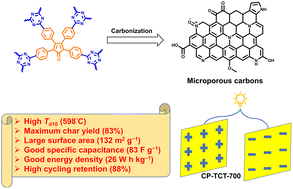Tetraphenylcyclopentadiene-based conjugated microporous polymers for high-performance energy storage carbons†
Abstract
Conjugated microporous polymers (CMPs) are applied as auspicious electrodes for energy storage devices. Unfortunately, some synthesized CMPs have low electrical conductivity and poor redox efficiency, which restrict their practical utilization. Here, we have developed the Friedel–Crafts polymerization of a cyanuric chloride core and tetraphenylcyclopentadiene-based linkers to produce novel tetraphenylcyclopentadiene-based CMPs, which are thermally transformed at elevated temperatures into porous carbonaceous electrode precursors for supercapacitors. Various techniques were used to investigate the chemical structure, porosity, thermal stability, morphology, and electrochemical properties of CMPs before and after thermal transformation at 700 °C. Among the materials under study, we noticed that the cyclopentenone-trichlorotriazine polymer calcined at 700 °C (CP-TCT-700) demonstrates the highest degradation temperature (Td10 up to 598 °C) with the maximum char yield (83%), large BET surface area (132 m2 g−1), and sponge-like morphology. According to the electrochemical experiments, the specific capacitance (83 F g−1) and energy density (11.65 W h kg−1) of CP-TCT-700 are superior to others at 1.0 A g−1 in 1 M KOH solution. In addition, its cycling retention is confirmed with a value of 88% of its gravimetric capacitance over 5000 cycles. The excellent electrochemical behavior of CP-TCT-700 as an electrode material may be related to its highly porous carbon structure and higher nitrogen and oxygen contents.



 Please wait while we load your content...
Please wait while we load your content...